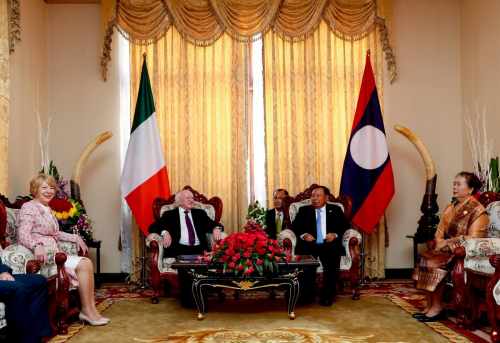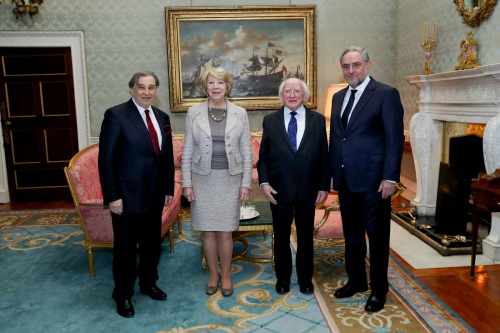Speech during a visit to the Islamic Cultural Centre of Ireland
The Islamic Cultural Centre of Ireland, Dublin, 21 November 2016
I am delighted to join you all here today following the completion of a successful Neighbourhood Week 2016 and also the ‘Celebration of Islamic Arts’ Exhibition which I have just had the pleasure of viewing. I would like to thank all those involved with the Islamic Cultural Centre for their kind invitation to join you all here today, and everyone here for that generous reception.
Is é seo an dara huair dom labhairt libh agus páirt a ghlacadh i bhur "Seachtain Comharsanachta" bhliaintiúil. Is ócáid í atá tar éis fás agus forbairt, ní hamháin mar ócáid shóisíolta dóibh siúd a bhaineann leas as an tIonad go rialta, ach chomh maith mar deis do dhaoine eile chun eolas a fháil ar thraidisiúin, ar chultúir agus ar chreideamh phobal Ioslamach na hÉireann.
[This is the second time I have had the pleasure of speaking to you and sharing in your annual neighbourhood week. Your event has gone from strength to strength, not only as a social occasion for those who regularly use the Centre but also in the opportunity it provides for others to learn more about the traditions, cultures and beliefs of Ireland’s Islamic community.]
May I particularly thank Sheikh Hussein Halawa, Imam Dr Nooh Al Kaddo, and Mr Shaheen Ahmed for welcoming me so warmly to the Islamic Cultural Centre. I greatly appreciate the work and thought which has been involved in today’s event. I, and so many others, will further appreciate the opportunity to view the skills and artwork on display, which range from the Craftsmanship of Morocco to the Calligraphies of Iraq and China, providing an impressive overview of the great culture and heritage which so defines your community.
Speaking of art and cultural inheritance, earlier this year I had the pleasure of opening an important exhibition of the Chester Beatty Library, Lapis and Gold: The Ruzbihan Qur’an. Making available works of such grace and sophistication as the Ruzbihan Qur'an brought us that evening, as it will for so many visitors to the Chester Beatty, deeply into the ancient and glorious Islamic civilisation; and an impressive reminder of how that civilisation has passed from generation to generation across the centuries.
On that occasion, I quoted the words of the orientalist Henry Corbin who described Islamic Persia as:
“A world both intermediate and mediating... an entire spiritual universe, an arena for the history of religions.”
I spoke of the profound importance of those words in a world where advocates of a distorted and hateful version of Islam are persecuting those of other persuasions, first and foremost other Muslims, and seeking, in their fanatical fury, to destroy the cultural traces of previous civilisations.
Today, at this particularly historic juncture, opportunities to encounter Islamic culture directly are an important tool in counteracting an increasingly widespread Islamophobia; fuelled by an ignorance of the politics and history of the Middle East, ill informed stereotyping, a blindness to the many ways in which our Muslim citizens and residents enrich our lives, and a misrepresentation of the tenets of the Islamic faith itself.
Events such as the Islamic Centre Neighbourhood Week are important occasions in enabling us all to have a deeper understanding of the creative and intellectual accomplishments of the different traditions and cultures that make up our world.
This year’s Islamic Arts Exhibition invites visitors to not only admire the colour and vibrancy of Arabic handicrafts, but to understand the important statement such works make about the cultural values that lie at the heart of the Islamic world.
The marquetry, the metalwork, the carving, embroidery, calligraphy and visual art on display here today, all bear witness to the wide range of regional influences to which Islamic art has been subjected, but also to its unique and cohesive identity which embodies the Islamic way of life. Such work is a great reminder of how civilisations flourish and thrive through the creative appropriation of their past, an openness to newcomers and new influences, and the nurturing of knowledge and the arts. We are, after all, creatures who carry multi-layered identities – identities which do not imprison us from new imaginative worlds or curtail, either, our curiosities, our courtesies, our hospitality.
The hospitality of the Islamic community is embodied in the neighbourhood week. It provides an interpretation of true integration as a mutual process requiring both active participation and real engagement between host countries, and the newer communities they wish to welcome into their society.
It is also a valuable outward expression of the hand of friendship that the Islamic community consistently and generously holds out to its wider community. It allows for the creation and strengthening of new connections with your neighbours. It also enables a sharing of the culture and heritage of which you are understandably very proud.
Recent decades have seen Ireland become an increasingly multicultural society, the co-existence of diverse cultures manifested through a rich variety of languages, spiritual beliefs and rituals.
People have migrated to Ireland for a myriad of different reasons including fleeing war and persecution, for study and work purposes, to seek new opportunities, and to reunite with family members already here. The conflict in so many parts of the world has given rise to a huge tide of people who no longer have a safe place to call home. Many people who arrive here are leaving behind their families, friends and communities in search of a safe haven. Others have come with close family members, with spouses and children. Yet others have come alone. Most who come share the hope of a peaceful existence and an opportunity to contribute to their new communities and society.
The Islamic community has played its own important role in creating the great tapestry of multiple cultures that forms modern day Ireland. Indeed, our Muslim population has grown significantly in the past twenty years and today an estimated 65,000 Muslims call Ireland home. Your community is a multi-dimensional one encompassing citizens from Pakistan, Nigeria, Malaysia, Algeria, Libya, Somalia, South Africa, Syria and Iraq who bring with them their own unique customs, culture, language and family traditions.
Like so many others who have arrived on our shores as strangers, but with minds open to the forging of new friendships and connections, your road has not always been an easy one.
As President of Ireland, I have had the privilege of visiting many communities across the country and witnessing many remarkable stories of courage, commitment and achievement by so many who came here as immigrants and bravely rose to the challenge of making friends, learning new languages, and adapting to their new country, new home, new landscape and culture.
They have been inspiring stories, written in many cases through the everyday language of community involvement; of participation in voluntary activities, fundraising, sporting events and local clubs and organisations. It is through the building of such social networks, the coming together with others in a spirit of shared interests, goals and objectives, that we create fertile ground for the flourishing of understanding, tolerance and mutual respect.
In our ambition to build such an Ireland, we must ensure we create a landscape in which different cultural identities are enabled to exist in harmony, neither subservient to the other; one which encourages a respectful curiosity about different cultures and enables easy access to all points of entry to Irish culture.
This year, of course, the Islamic Cultural Centre celebrates its twentieth anniversary. I would like to take this opportunity to congratulate you on that important landmark, and also to thank you for the important role you have played throughout those two decades in enabling Ireland’s Islamic community to become fully engaged, and active members of their wider social and national community. Through engaged dialogue, constant effort to improve understanding and respect for our differing cultures and beliefs, and a real will to build relationships on all that we have in common, you have provided invaluable opportunities to combat prejudice and misunderstanding, and promote tolerance and acceptance.
May I conclude by thanking you all, once again for the welcome you have extended to me today, just as you so warmly welcome all those who come here to learn, to understand more about your culture, or simply in a spirit of neighbourly goodwill.
I wish you well as you continue with your important work and I am confident that this year’s neighbourhood week will be a fruitful and successful one.


